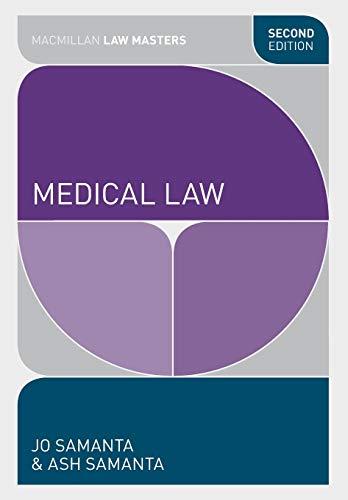Question
Ouestion 1 Patrick, a wealthy lawyer from Pori Colborne undertook to contribute $2,000,000.00 to Brock University's capital campaign, payable in 4 annual instalments of $500,000.00.
Ouestion 1
Patrick, a wealthy lawyer from Pori Colborne undertook to contribute $2,000,000.00 to Brock University's capital campaign, payable in 4 annual instalments of $500,000.00. On the occasion when Patrick made the pledge the President of the University stated that the University would now be able to undertake the construction of an additional building and continue with its application to establish an accredited law school. A picture of Patrick and the University President was published in the local paper and on the University's website together with a news item about Patrick's
generous contribution to the campaign.
One month later Patrick asked if the University would name the new law school building after him. The President agreed and said the University would be honoured to call the new building "Patrick Hall" in recognition of his pledge.
One year later, following payment of the first instalment of the pledge and as consuuction was about to begin, the President contacted Patrick and advised him that in accordance with the University's naming policy, the University had recently entered into an agreement with Andrew,
another lawyer from Port Colborne, to name the new building, once completed, "Andrew Hall". Andrew had agreed to pay $5,000,000.00 for the naming rights for a period of 20 years from the completion of the building.
The President advised Patrick that a lecture hall in the building would now be named after Patrick. Patrick advised the University that it had breached their agreement and he would not be making any further payment. Patrick demanded the immediate return of the $500,000.00 he had paid. The University responded that it had hired architects and engineers, had closed off a parking lot, entered into a construction contract and commenced construction based on Patrick's promise and would be commencing legal action against Patrick for the balance of $ 1,500,000.00.
Required: Discuss the application of the principles of consideration and injurious reliance/equitable estoppel to the facts of this case. Will the University or Patrick succeed in the legal action? Is there additional Information which might affect the result?
Question 2
Erica's neighbour, Brad, has been employed as a mechanic for Central Service for the last 15 years. Erica, a student of business law, is aware that Brad has never acquired a mechanic's licence. Erica's car is in need of major repairs but she has no savings. Consequently, she concocts a scheme to have the repairs done without charge. At the Brock library Erica locates the following excerpt from the Apprenticeship and Tradesmen's Qualification Act.
11(2) No person shall work or be employed as a motor vehicle mechanic unless the person holds a subsisting certificate of qualification.
(3) No person shall employ any person as a motor vehicle mechanic unless the person employed holds a subsisting certificate of qualification.
Penalty Provision: 26(1) Every person,
(a) who contravenes any provision of this Act or the regulations is guilty of an offence and on conviction is liable to a fine of not more than $10,000.00.
Erica takes her car to Central Service and has the engine replaced, specifying that Brad make the mechanical repairs. Brad does an excellent job in repairing the vehicle. Central Service presents Erica with a repair bill for $3,000.00 ($2,000.00 for parts; $1,000.00 for labour). Erica promises to
drop off a cheque the next day and drives the car home. She then sent the following email to Central Service:
As the repairs to my vehicle have been performed by an mechanic confrary to Section 1 1 of the Apprenticeship and Tradements Qualifications Act, and because I am not yet 18 years old, I am not legally obligated to pay your invoice.
The management of Central Service seek your advice as to the viability of a legal action against Erica to force her to pay the account.
Required: Indicate whether or not, and to what degree, if any, Central Service can succeed in its action against Erica. In your answer be sure to identify the countervailing public policies in issue.
(ii) After being served with the legal action, Erica concocts plan B. She delivers a cheque to Central Service for $1,000.00 with the notation "in full payment of my indebtedness". Central Service cashes the cheque but proceeds with the legal action to collect the balance. Erica claims
that they cannot continue the action since they cashed the cheque.
Required: Who is right? Explain with reference to the applicable legal principles.
(iii) Central Service advises Brad that they are deducting $2,000.00 from his pay (the amount that Erica has refused to pay) since Brad is in contravention of Section 1 1(2) of the Act since he is working as a mechanic.
Required: Would Brad be successful in an action against Central Service for the withheld wages or could they successfully defend the Action? Explain.
Step by Step Solution
There are 3 Steps involved in it
Step: 1

Get Instant Access to Expert-Tailored Solutions
See step-by-step solutions with expert insights and AI powered tools for academic success
Step: 2

Step: 3

Ace Your Homework with AI
Get the answers you need in no time with our AI-driven, step-by-step assistance
Get Started


